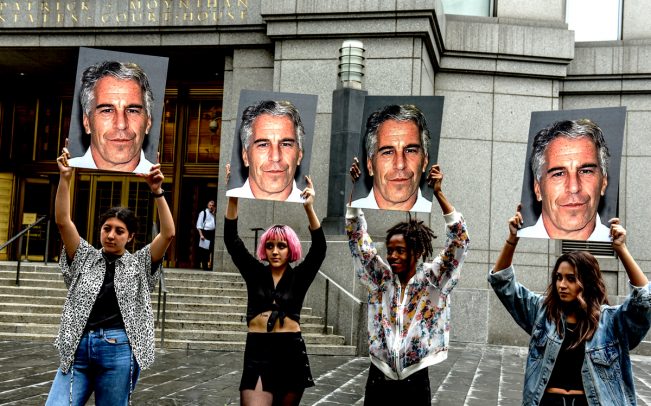Trending
What happens to Jeffrey Epstein’s properties now?
Lawyers for the financier’s alleged victims plan to continue with civil actions
Jeffrey Epstein’s death in a Manhattan jail cell put an end to the criminal case against him, and raised a fresh round of questions for his accusers and their supporters.
Chief among them, can the women seek restitution from the dead financier’s estate, which includes multiple luxury properties in New York, New Mexico, Paris and the Virgin Islands?
Former federal prosecutor Silvia Piñera-Vazquez said nothing was preventing his estate from selling the properties, now the criminal forfeiture case was over, unless an injunction was filed.
However, Piñera-Vazquez said there were still multiple ways Epstein’s accusers could get restitution through Epstein’s properties, including filing a civil case against his estate. (The first civil suit was announced on Wednesday.)
Federal prosecutors could also file a civil forfeiture case against Epstein’s individual properties. To do this, the government would need to prove the property in question was bought with dirty money or used in the commission of illegal acts.
In these cases, forfeited properties are sold and the proceeds are placed in a fund by the Department of Justice. When the money is distributed, the government decides how much goes to the accusers.
Piñera-Vazquez said accusers would probably get more money through filing their own civil suits because in that forum they could seek punitive damages — something not considered by the government.
The Department of Justice has a spotty record selling forfeited properties, which can generate windfalls for the brokers involved but can also be difficult to market.
Townhouse specialist Paula Del Nunzio, of Brown Harris Stevens, said Epstein’s New York townhouse would require “remarkably capable, creative marketing,” to overcome its reputation.
“When you have a suicide by the owner, certain buyers will not take the building,” she added. “Even if the suicide did not occur in the building.”
Would she be willing to market it? “I’m willing to take on any property of this type because this is what I’ve specialized in for several decades,” she said.
Donna Olshan, president of Olshan Realty, said the value of Epstein’s Upper East Side property, in one of Manhattan’s choicest locations, would ultimately outweigh its past.
“For rare trophy properties, there are always buyers,” she said. In this case they will range from individuals to foreign countries looking for an embassy to the possibility of the house being used as the headquarters for a foundation or corporation.”
“I am not sure that Epstein’s sordid past will affect value. What will affect value is timing — prevailing market conditions will ultimately dictate the price.”
Epstein, 66, was found dead of an apparent suicide on Saturday at 6:30 a.m. inside the Metropolitan Correctional Center in Manhattan. At the time of his death, he was facing federal charges of sex trafficking and sex trafficking conspiracy, involving girls as young as 14.
The financier owned a slew of luxury properties in Manhattan, Palm Beach, New Mexico, Paris and the Virgin Islands. (The latter, an island named Little St. James, was reportedly known to locals as “Pedophile Island.”) In a summary of assets to federal authorities last month, Epstein estimated the value of his properties was over $180 million.
The Paris property, just blocks from the Arc de Triomphe, could make legal claims complicated, because while his accusers can file cases against any of his homes, the government is limited to those in the U.S.
“If a property is located in another country, there’s no jurisdiction for a civil forfeiture [from the government] unless you get the prosecutors in that country to file the case under whatever current law they have,” Piñera-Vazquez said.

A protest group holds up signs of Jeffrey Epstein (Credit: Getty Images)
Epstein’s townhouse at 9 East 71st Street has been the subject of particular scrutiny. According to a federal indictment, the 21,000-square-foot mansion was the location where Epstein abused dozens of his victims, often allegedly luring them there and paying them in cash, claims he denied.
In an op-ed in The New York Times on Wednesday, Jenifer Araoz recounted walking into the mansion at the age of 14, noting that there were visible security cameras, and small televisions playing footage in real time.
“I can still remember watching myself on those screens as I walked into the house of the person I came to know as a predator, a pedophile, my rapist,” she wrote.
The 50-foot-wide mansion was purchased in 1989 by Victoria’s Secret mogul Leslie H. Wexner for $13.2 million. Wexner transferred the property to Epstein — then his financial advisor — in 1995, though there is no record of any money changing hands.
The sprawling home is reported to be worth $77 million today, though some brokers say it could sell for a higher price in part because it’s 50 feet in width (most Manhattan mansions measure 20 feet in width) and its location off Fifth Avenue is among the most desirable in the city.
In the month before his death, Epstein was found unconscious with marks around his neck and subsequently placed on suicide watch. For reasons not immediately clear, he was take off suicide watch 12 days before his death. According to The New York Times, the two guards assigned to check on Epstein every 30 minutes had fallen asleep, left him unattended for about three hours and falsified a log to cover up their mistakes.
On Tuesday, the Department of Justice said the warden and two employees at the prison had been placed on administrative leave.
Attorneys for Epstein’s accusers could not be reached for comment.
National Suicide Prevention Lifeline: 1-800-273-8255





